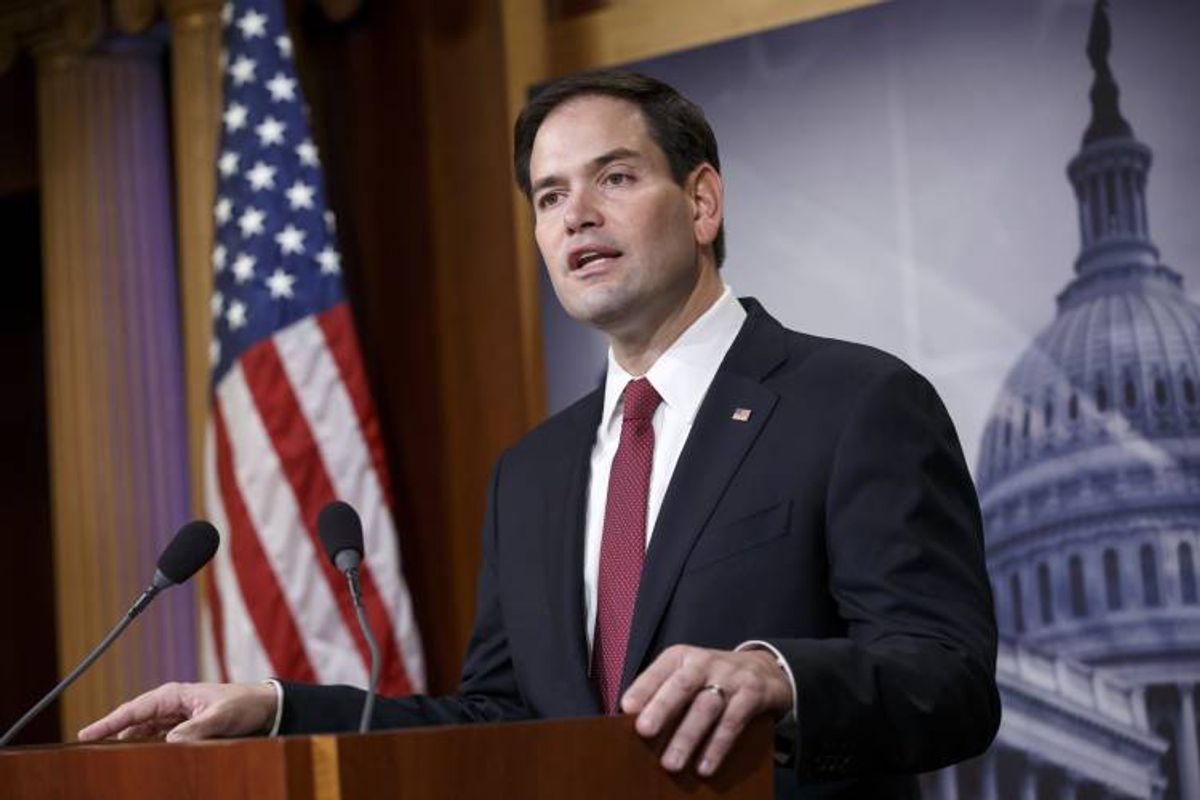In less than two weeks, Marco Rubio will in all likelihood be an official candidate for president. By that point he’ll likely be one of three fresh-faced, young Republican senators in the presidential mix, joining already-declared Ted Cruz and Rand Paul, who will probably announce his own run early next week. And in the run-up to Rubio’s official announcement, his advisers are doing everything they can to hype the b’jeezus out of the Florida senator’s political potential.
Whit Ayres, Rubio’s pollster, is describing his boss as “the Michael Jordan of American politics,” and casting Rubio as the Republican with the best chances of dragging the GOP out of its demographic decline:
Rubio is preparing to launch his presidential campaign on April 13 in his home base of Miami. Ayres, one of Rubio's top advisers, cast the son of Cuban immigrants as the kind of "transformational" candidate who could expand the Republican Party's demographic appeal to the diversifying U.S. electorate and take back the White House.
There’s no shortage of Republican candidates who think that they’re the ones who can expand the GOP’s share of the electorate and eat into traditionally Democratic constituencies. Rand Paul is betting that he can poach younger voters and African Americans with his libertarian-ish positions on criminal justice issues. Jeb Bush backs comprehensive immigration reform and speaks fluent Spanish, which is supposed to endear him to Hispanic voters. But according to Ayers, Rubio is the man to bring Hispanics into the GOP fold:
He added: “We need to nominate a candidate that sends a message that we want Hispanic-Americans in the center-right coalition – that we want you as part of our team, because the Republican values of equal opportunity for all and greater economic growth and limited government work for all people regardless of race, creed or color.”
A good choice, he noted, would be Rubio, the West Miami Republican expected to announce his candidacy within two weeks.
It’s a fun theory. It’d be even more compelling if there were any real reason to think it’s true.
Rubio’s problem with Hispanic voters is the same problem faced by all Republicans: he’s a Republican. He and the rest of the party are broadly out of step with Hispanics on issues they care about: immigration, the economy, foreign policy, healthcare, etc. The GOP has spent the better part of a decade demonizing Hispanic immigrants and gleefully sabotaging legislative attempts to address undocumented immigration. As a result, the Republican share of the Hispanic vote in presidential elections has crashed over the last 11 years.
At this point you may be saying “But Rubio’s different! He’s the son of Cuban immigrants, and didn’t he sort of back comprehensive immigration reform that one time?” That’s true! That also doesn’t really seem to matter. Back in the summer of 2013, shortly after Rubio worked diligently to pass the Senate’s comprehensive immigration reform bill, Latino Decisions ran a poll asking Hispanic voters who they’d support in a hypothetical 2016 presidential race. Rubio, the Republican of Cuban heritage who had just staked his political reputation on passing a controversial immigration reform bill, got 28 percent – just one point higher than Mitt “Self-Deportation” Romney’s share of the Hispanic vote in 2012.
Since then Rubio’s beat a hasty retreat from his politically exposed position as being the Republican who backs “amnesty,” renouncing his own bill and signing on to the GOP consensus of “border security first.” His support for a comprehensive reform bill didn’t do him much good to begin with, so abandoning it to try and get right with the Tea Party set makes at least some political sense, but none of this suggests that he’s somehow uniquely positioned to siphon off Hispanic support from the Democrats.
And when you ask Hispanic voters who they think will be president come 2017, a strong majorty – 57 percent – say Hillary Clinton. A vanishingly small 5.8 percent see Rubio in the Oval Office.
Maybe I’m selling Rubio short and not seeing the secret political alchemy he possesses that makes him the GOP’s “transformational” 2016 candidate, but even Whit Ayres would argue that Rubio has a tough road ahead to fulfilling this aspirational role. According to Ayres’ own math, the 2016 Republican candidate must win at least 40 percent of the Hispanic vote – a tally that hasn’t been achieved since George W. Bush took somewhere around 44 percent in 2004 – in order to win the White House. That means Rubio will have to single-handedly undo a decade-long trend in voter preferences while running on a platform that Hispanics consistently reject when voting for a president, while also overcoming his own checkered history on immigration.
Sounds pretty difficult. I hear he gives a good speech, though.

Shares